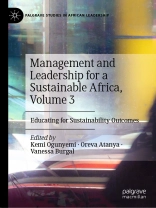To effectively deliver sustainable management in practice for Africa, we need responsible leadership. We need to deepen our understanding of sustainability in the unique socio-political and economic context of the continent. The roles of various actors across public, private and non-profit sectors as enablers of sustainable development need to be explored to understand the social, economic and environmental (SEE) trends in Africa and its emerging and developing economies, as well as to chart the way forward for the continent.
This third volume focuses on education as a tool to build a sustainable Africa. It explores the use of pedagogical approaches, learning resources, and policy implementation to develop African leaders and managers with a sustainability mindset that feeds into leadership decision-making, systemic change management, and efficient and sustainable transfers of knowledge and practice. The case stories from various academic institutions present practicable and innovative ideas for educating those who will lead sustainable development for Africa’s future.
The African scope of the book is hinged on collaboration from authors across Africa and the inclusion of case stories from emerging economies in the five African subregions (East, West, North, Central and Southern Africa) within the chapters. The core message is that, to achieve effective and sustainable management and development for Africa, the practice of responsible leadership is critical.
Inhoudsopgave
Chapter 1: Educating for sustainability outcomes – What do we mean?.- Chapter 2: Education for Sustainable Development (ESD) in Egypt – An Interpretivist Analysis of Teaching and Pedagogy in Higher Education Institutions (HEIs).- Chapter 3: 3 Leading with Purpose for Education for Sustainable Development – Field Trips in Language Teacher Education Kamini Moteea.- Chapter 4: Introducing Ecopoetry in Teacher Education to Promote Sustainable Education at the Lower Secondary Level in Mauritius.- Chapter 5: Raising Sustainability Awareness at the Grassroots.- Chapter 6: S6 Importance of Communicating Sustainability to The Entire Value Chain.- Chapter 7: Best practices in communications to support circular economy adoption.- Chapter 8: Training business leaders and policymakers on the need to integrate sustainability into decision making.- Chapter 9: Ensuring sustainability in Education amidst the 21st century uncertainties: A Case Study on Educators’ readiness for remote teaching of Chemistry.- Chapter 10: Educating Africa for sustainability – a leadership responsibility.
Over de auteur
Kemi Ogunyemi is Associate Professor of Business Ethics in Lagos Business School at Pan-Atlantic University, Nigeria. Oreva Atanya is Sustainability Centre Manager in Lagos Business School at Pan-Atlantic University, Nigeria. Vanessa Burgal is a Marketing lecturer in Lagos Business School at Pan-Atlantic University, Nigeria.












